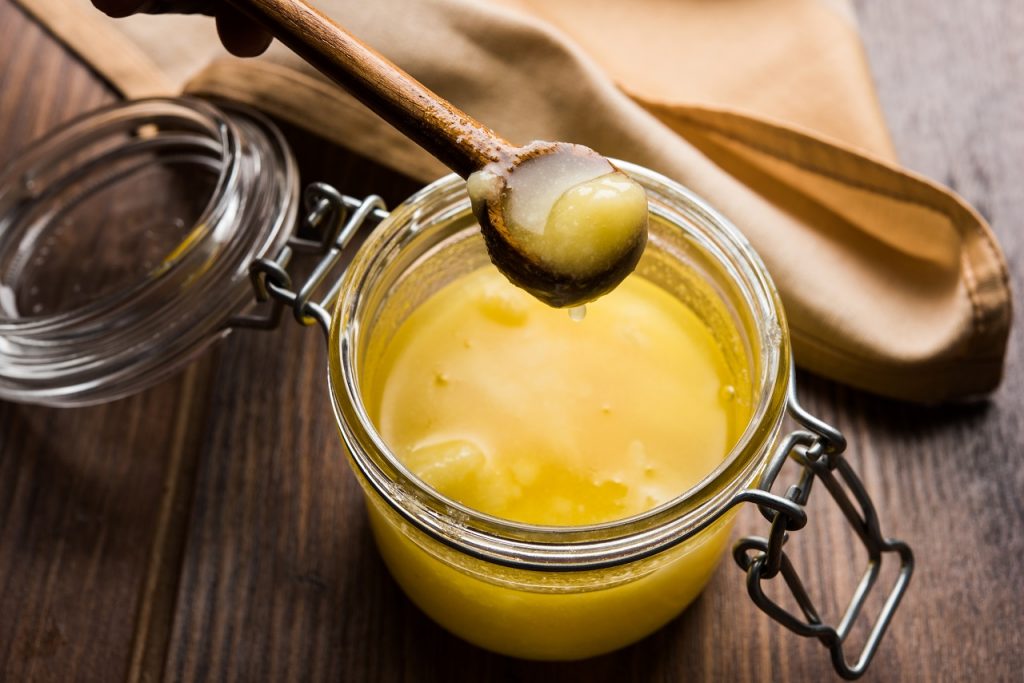
Ghee has always been a part of the Indian tradition as one of the healthiest milk products. In Indian households, we generally use ghee made at home with cow milk. Recently a new type of cow ghee has appeared in the dairy market known as A2 Cow Ghee. Looking at the name, A2 Cow Ghee seems like some kind of a new trend in the health market but it is cow ghee made from A2 milk. Let’s understand it better.
We all know that milk is a good source of protein. However, ghee is pure fat but contains a very small amount of protein as well. There are two types of protein found in milk called casein and whey. There are also different types of casein protein, one of which is beta-casein. A1 & A2 are actually two variants of beta-casein that make up about 30% of total protein in cow’s milk. Traditionally in India, cows produced milk that contained only the A2 form of beta-casein, but today, most of the milk available in local stores contains mostly A1 proteins.
The Difference Between A1 and A2 Cow Ghee
Reading the name, both types seem like brothers of the same family but there is a huge difference between their source and effect on health. Ghee when made using A2 milk which has only A2 Beta casein (a type of protein) is called A2 ghee. This type of protein is found in the milk of only some native Indian breed of cows and some other animals like the Indian buffalo, goat, sheep, camel, etc.
On the other hand, ghee made from milk having only A1 beta-casein or sometimes both A1 and A2 beta-casein is called A1 cow ghee. A1 beta-casein is found in all commercial dairy products that we use in general due to foreign breed or crossbreed cows in India. It’s cheaper as the milking capacity of crossbred cows is greater than desi cow and the total number of them is also huge. Obviously, A1 milk is no way better than A2 milk.
The beta-casein in A1 milk has a structure that allows a short molecule called beta-casomorphin-7 or BCM-7 to split off during digestion. Some foreign researchers say that this small protein can cause various problems ranging from juvenile diabetes, autism, schizophrenia, allergies to auto-immune diseases such as Multiple Sclerosis and Parkinson’s. While the percentage of people with immediate effects is very small, the consequences are severe for affected individuals. On the other hand, A2 cow milk is comparable with breast milk when it comes to health benefits and digestibility.
What Are It’s Benefits?
Being higher in nutrition values such as protein, iron, sodium, calcium, vitamin A, D, E with Omega 3 and 9 fatty acids, A2 cow ghee has many health benefits.
- Slows the aging process and is good for skin & hair
- Helps recover from wounds
- Prevents diseases like asthma & headaches & alleviates insomnia
- Best for joint massage & treating broken bones
- Treats gastric issues
- Lowers bad cholesterol and does not cause blockages
- Makes your voice soft
- Great for people who are trying to lose weight
- Boost immunity
- The best option for Nasya kriya which has many benefits for health
- Suitable for even lactose-intolerant people
- Reduces inflammation
- Excellent for growing kids and pregnant women
Hope this information is helpful. Don’t hesitate to add at least 1 tsp of A2 cow ghee in your daily diet considering its multiple benefits for your body and mind.
You can get Pure Desi A2 Cow Ghee from the GOQii Health Store for a discount using GOQii Cash – all within the GOQii App. For more on nutrition, check out Healthy Reads or ask an expert by subscribing for personalized health coaching here: https://goqiiapp.page.link/bsr
#BeTheForce




HOW TO TEST THE DIFFERENCE OF A1 OR A2
It is not told in the information given whether ghee has protein a2 or not. If not then what is the difference in the end product whether it is made from a1 or a2 milk.
Is n’t it cheating in the name of a2?
Nice blog and very easy to understand your blog keep sharing these type of blog.